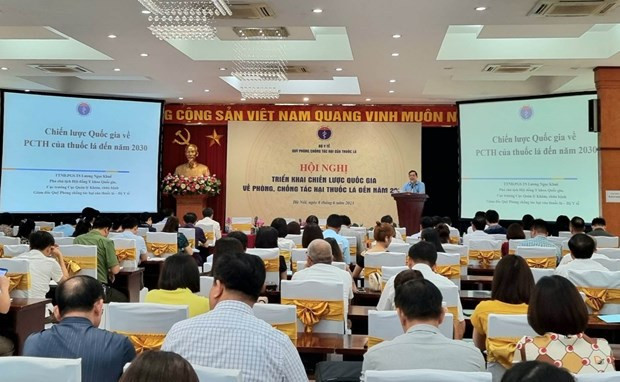The official stated this at a conference on implementing the National Strategy on Tobacco Harm Prevention and Control to 2030 held by the Ministry of Health (MoH) and the Vietnam Tobacco Control Fund (VNTCF) on June 8 in Hanoi.
According to Thuan, the inspection and handling of relevant violations have not been carried out regularly, smoking cessation support services have not yet met requirements, and inter-sectoral coordination in prevention and control of tobacco harms is weak due to a lack of attention.
He highlighted the significance of the strategy, saying that it sets a goal of reducing the rates of tobacco use and passive smoking in order to reduce the risks of morbidity and mortality caused by using tobacco products.
 At the conference on implementing the National Strategy on Tobacco Harm Prevention and Control to 2030. (Photo: VNA)
At the conference on implementing the National Strategy on Tobacco Harm Prevention and Control to 2030. (Photo: VNA)The strategy also aims to reduce the rate of passive smoking at work to less than 25%, at restaurants to less than 65%, at bars and cafes to below 70%, and at hotels to below 50%; and continue to prevent the use of e-cigarettes, heated tobacco, shisha and other new tobacco products in the community.
To that end, Thuan suggested that ministries, sectors and socio-political organisations need to coordinate and focus on performing a number of important tasks such as preventing the use of e-cigarettes and heated cigarettes among young people, thereby also directly limiting the risk of using other stimulants and drugs, and intensifying the enforcement of the law on tobacco harm prevention and control.
He also called for raising tax on tobacco products and develop consultation and treatment services for quitting smoking.
Attention should be also paid to diversifying forms of communication on tobacco harm prevention and control; and promoting education and communication on tobacco harms at educational institutions, he added.
According to Associate Professor Dr. Luong Ngoc Khue, Director of the MoH’s Department of Medical Examination and Treatment, and Director of the VNTCF, smoking is the leading cause of non-communicable diseases such as cancer and cardiovascular diseases./.





























